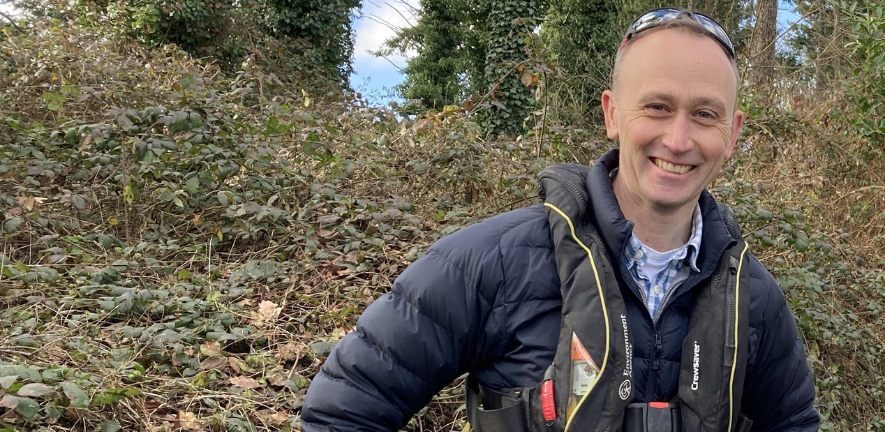
Submitted by Jane Durkin on Tue, 02/07/2024 - 12:02
Studying Plant Sciences at Cambridge can open up a wealth of career opportunities. In this series, we hear from Plant Sciences alumni about their experiences of studying here, how it shaped their careers and what they are doing now.
If you would like your alumni story featured, please email us at alumni@plantsci.cam.ac.uk.
About Robert
Dr Robert Bradburne MA FRSB graduated with a 1st Class degree in Natural Sciences in 1996 studying at Sidney Sussex College. He went on to study for a PhD in crop genetics at the John Innes Centre. After a short research career, he joined the Department for Environment, Food and Rural Affairs, where he participated in the Civil Service Fast Stream and held a number of science and policy posts. He now works as the Environment Agency’s Chief Scientist leading a team of over 200 scientists to support sustainable development and help improve the environment.
What is your favourite memory from your time in the Department of Plant Sciences?
I have two very enduring memories of my time as an undergraduate. First was Part II being a small enough course to get to know the individual professors really well. The supervisions I had were always stimulating. I particularly remember arguing quite trenchantly with a great friend of mine about some aspects of plant ecology on which we disagreed in front of Professor Peter Grubb. I remember Professor Grubb letting us argue, gently steering and questioning, all with a smile on his face. I don’t know which of us ‘won’ the argument on that day, but let’s just say that my friend has gone on to become an eminent ecologist, and I didn’t!
The second thing I remember is experiments ‘not working’. This gave me my first taste of ‘real’ science, especially in my final year. Whether it was trying to scale up a test to investigate the dynamics between Rhizoctonia solani and Trichoderma viride and going too far and wasting a week’s hard work (and some expensive reagents – sorry!), or discovering some new stomata forming on Kalanchoe leaves that ‘weren’t supposed to be there’, it showed me that science was going to be hard work, but could be genuinely exciting when you discovered something that no one was expecting.
How did your time in the Department influence your career journey?
I always wanted my science to be useful. When deciding between Plant Sciences and Zoology in my final year, this is the main thing that drove me to choose Plant Sciences, and I’m really glad I did. Throughout the plant sciences course, the diversity of science covered was enormous. The flexibility to study what most interested me in the final year was brilliant for setting up my future career. I found that I could study epidemiology, genetics, ecology, palaeontology, physiology and conservation science all in the same course.
The approach to teaching positively encouraged me to make links across subjects and explore new avenues. This breadth of knowledge and ability to think across different science areas was just what I needed in my career delivering science and advice to Government. Much of the time I wouldn’t know what questions I might be asked, so I could not be the absolute subject expert. What was more important was a broad knowledge base and an ability to make connections and come up with novel solutions to problems – that’s just what my time in the Department has enabled me to do.
What have you gone on to do since leaving the Department?
I left Cambridge for a PhD in crop genetics at the John Innes Centre. After a short post-doctoral career researching wheat genetics, I moved to the Department for Environment, Food and Rural Affairs to help them procure and use research to benefit a range of horticultural crops. I then joined the Civil Service Fast Stream and enjoyed a variety of posts (scientific and policy making) before taking leadership of a team looking at new ways of incorporating nature’s value into decision making. I worked part time for nearly a decade so that I could share childcare responsibilities with my wife, and was grateful to be working in an organisation where this was no impediment to pursuing a rewarding career.
Ultimately, all of those posts gave me the experience and technical understanding I needed to become the Environment Agency’s Chief Scientist. Here, I lead a talented team of over 200 scientists and analysts producing research, evidence, and advice to help improve the environment and support those working all over the country to protect it from harm, while supporting sustainable development.
What do you enjoy most about what you are doing now?
It’s a real privilege to be able to be doing a job that makes such a positive difference to people’s lives and to our natural world. I get to work with fabulous scientists across a huge range of disciplines all over the country. One day I might be discussing how we prepare for the impacts of climate change, another, how to use chemicals more sustainably, and another how to use novel technology to trace sources of pollution in our watercourses. I get to give advice directly to those with the power to make really big decisions which alter society’s relationship with nature, and I love promoting the science we do to large audiences within and outside of Government.
I still use my learning from my time in the Department of Plant Sciences to help me think around some of the complex issues that face the English environment, and I am delighted to maintain links through individuals, secondments, and opportunities to talk to students and graduates about the opportunities for using their plant sciences training in public service.
Photo: Robert Bradburne during invertebrate monitoring in a stream near Exeter with the local team
